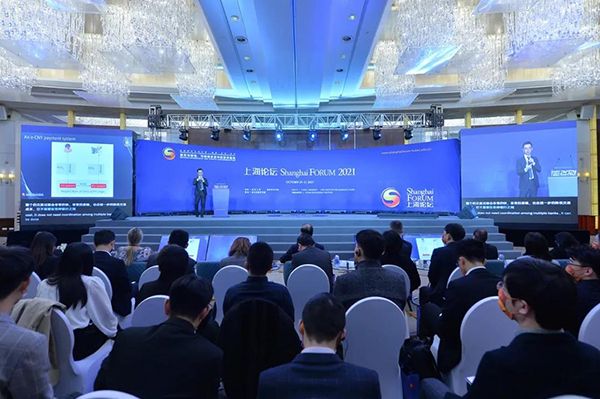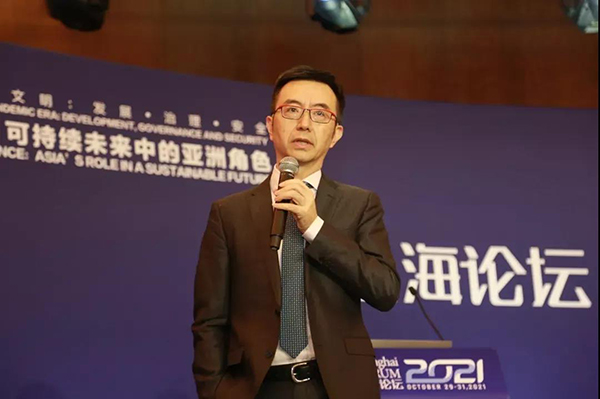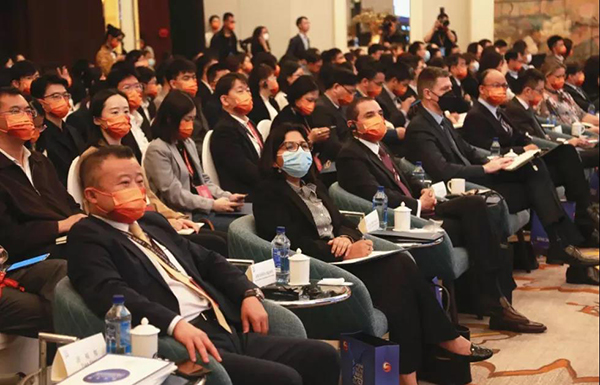Professor Jun Qian Attends Opening Ceremony of Shanghai Forum 2021, Analyzing Global Digital Monetary Framework and Development Trends
发布时间:2021-10-31

On October 29th 2021, the annual meeting of “Shanghai
Forum 2021” commenced at Fudan
University, focusing on “Recovery and Resilience: Asia’s Role in a Sustainable
Future”. Through both online and offline channels, a total of over 2200 guests
and representatives from thinktanks, universities, academic institutions,
enterprises, governments and media in more than 40 countries around the world
attended the forum to discuss the development of Asia in the future. Professor
Jun Qian, Executive Dean of FISF and Professor of Finance, was invited to
attend the opening ceremony and give a keynote speech entitled “Digital
Currency and Reform of Global Financial System”.

Professor Qian first made it clear that the demand for cross-border
payment and the emergence of mobile payment will primarily account for the rapid
development of the digital currency system. At present, the constantly evolving digital currency has gradually
constructed the global
double-layer digital currency framework: the upper-layer system mainly consists
of digital currencies issued by the central banks of sovereign states, i.e.,
central bank digital currencies (CBDC); while the bottom-layer system refers to
“decentralized” digital currency system issued by other banks, such as the
bitcoin and Ethereum. Qian then mentioned a life scene of buying bread to give
a vivid explanation of the operating mechanism of CBDC and lead to the concept
of E-CNY and the problems confronting the development of sovereign digital
currencies. He believed that E-CNY will be more
widely applied to various domestic consumption scenarios, and once used in cross-border
payment systems will upgrade the convenience and security of CNY and advance
its process of internationalization. Meanwhile, the application of cross-border payment of E-CNY will also be
faced with competition of other sovereign and non-sovereign digital currencies,
challenges in technology and regulation, as well as other problems that need to
be resolved urgently. At last, he expressed that currently there exist two issues to
discuss upon E-CNY. One is how should E-CNY successfully realize controllability
and anonymity; and the other is how to promote the co-existence of E-CNY and
the traditional CNY system. Globally, central banks in many countries and
regions are all actively planning to issue sovereign digital currencies, which
will have a continuous impact on the traditional monetary and financial system.
The opening ceremony of Shanghai Forum 2021 was hosted by Zhimin Chen,
Vice President of Fudan University. Ningsheng Xu, President of Fudan
University, and Taiyuan Cui, Board Director and CEO of Korean SK Holdings, gave
opening speeches.
Besides Professor Jun Qian, Jeffrey Sachs,
University Professor of Columbia University, Director of Sustainable
Development Center and Three-term Special Adviser to UN Secretary General;
Kishore Mahbubani, Former Ambassador to the United Nations and Founding Dean of
Lee Kuan Yew School of Public Policy at National University of Singapore; Svein
Stølen, President of University of Oslo, Norway, Bu Xu, Secretary General of Xi Jin Ping Diplomatic Thought
Research Center, Party Secretary and Director of China Institute of
International Studies, and China’s Former Ambassador Extraordinary and
Plenipotentiary to ASEAN and Chile, also participated in giving keynote
speeches.

At the opening
ceremony of the forum, Fudan Thinktank released Theme Report of Shanghai Forum 2021. Divided into five chapters of public health, finance, economy and trade,
carbon neutrality and population, the report was written by the expert team in
relevant disciplines at Fudan University. By focusing on the topic of “recovery
and resilience” and laying great emphasis on studies on critical issues and
trends that have already stood out and will be of greater significance in the
future in the field, it proceeds from China and extend to Asia and the whole
world, bringing forward the analysis and opinions of Fudan scholars, studying
and predicting future development directions and exploring solutions to cope
with common challenges.
Shanghai
Forum is a large international academic forum hosted by Fudan University and
Chey Institute for Advanced Studies in Korea and
organized by Fudan Development Institute. Based on Shanghai and depending on
the discipline advantages of Fudan University, it has successfully held 16
annual meetings since its establishment in 2005, with over 3000 lecturing
guests at home and abroad attending. With the aim of “focusing on Asia,
highlighting hot issues, gathering elites, promoting interactions,
strengthening cooperation and seeking consensus”, the forum is committed to
setting up a platform for the common communication among politicians, businessmen
and academics at home and abroad, making in-depth research and explorations
revolving major strategic issues and development problems in various fields
like global governance, social governance, public security, ecological
management, technological innovation and cultural civilization, and making
greater contributions to pushing forward human progress, national development
and peoples’ livelihoods.
Right now, the world is going through a hard time with double challenges
of unprecedented turbulence not seen over a century with the severe pandemic
situation around the world. The tremendous changes arising in the past year as
well as profound
adjustments following will continuously accompany and test the entire human
race within a foreseeable period. At this particular historical moment,
Shanghai Forum switched from the original topic of “Global Governance and Asia”
to “Post-epidemic Civilization: Development, Governance and Security”,
expecting to converge minds and provide wisdom for the future development of
Asia and the world in a more grand and humanistic way.